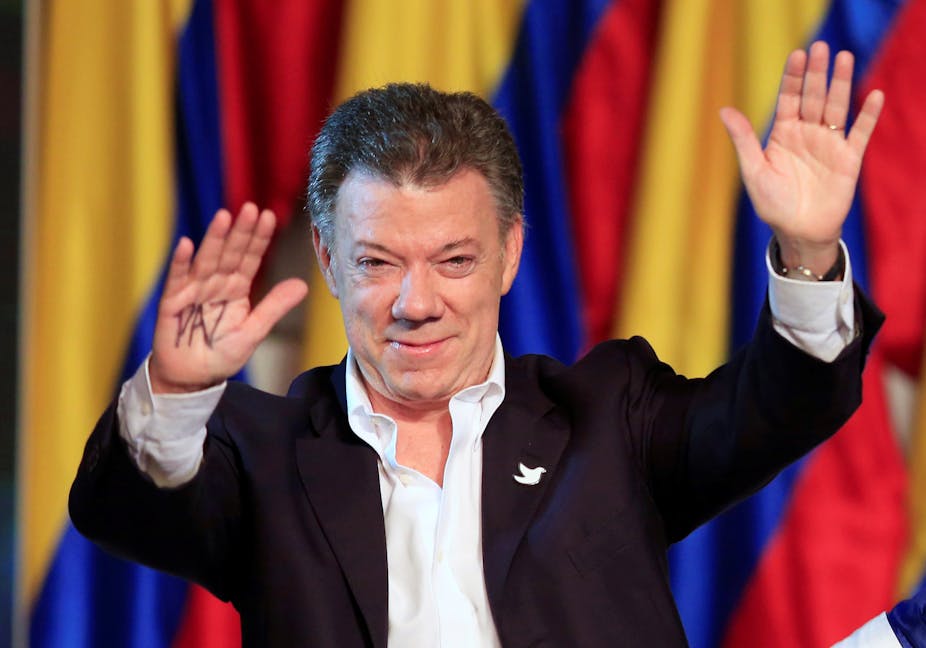What were the Nobel peace prize committee members thinking? Just a few days after it became clear that the peace agreement that Colombian President Juan Manuel Santos negotiated with the FARC literally cannot be given away, they award him the pre-eminent global prize for peace?
This is the reward for the biggest political miscalculation since David Cameron decided to gamble his own, his party’s, his country’s and Europe’s future on a Brexit referendum?
We shouldn’t be surprised. The committee likes to court controversy. It gave US President Barack Obama the prize one year into his presidency, before he had really achieved anything on the foreign policy front. The committee has also awarded statesmen well acquainted with violence – from Henry Kissinger to Arafat, Peres and Rabin. Mahatma Gandhi’s nomination was rejected multiple times.
So I for one am going to insist that I am not surprised by the choice this year, even if others were. The main pundit who follows the prize process dropped Santos from his shortlist after the Colombian referendum result. (“Colombia’s off any credible list”, said Kristian Berg Harpviken, head of the Peace Research Institute, Oslo, on Monday.) Santos disappeared from most prediction markets around the same time.
What was the reasoning? There are some critics who think that the Nobel Prizes are becoming too focused on media buzz. Perhaps the committee members were just looking for headlines?
I suspect this was not the reason. But there are other possibilities.
A consolation prize for Norway?
For several years now, there has been discussion in Norway about the prize’s role in promoting Norwegian foreign and economic policy interests.
Norwegian support has, after all, been absolutely central to the long and complex negotiations in Cuba between Colombia and the FARC. The rejection of the deal was seen in Norway as a setback not just to the peace process in Colombia, but to Norway’s own efforts to support that process.
Perhaps the committee saw the opportunity to give the prize to Santos as a chance to lift Norwegian spirits.

A catalyst for change
Perhaps, more charitably, the committee saw this as a chance to change the narrative around the peace deal – to give Santos and the supporters of the deal a boost, and the courage they will need to renegotiate the deal and win public support.
For now, with the former Colombian president and opposition leader Álvaro Uribe signalling his willingness to work with President Santos, peace has a chance. But there is also a danger that international meddling could cause a backlash by reactionary forces in Colombia.
Already, there are those who think that peace advocates beyond Colombia’s borders fail to understand the nefarious criminal nature of FARC, and, having not lived with its violence for decades as they have, are too willing to forgive and forget the hurts it has caused. For these critics, the referendum risked “giving the country away” to the FARC.
So there is a danger that the peace prize will just reinforce the notion that supporters of the accords were more in touch with the thinking of international elites than with local citizens. That perspective does, however, overlook a key fact: that the rural regions that have borne the brunt of the violence actually voted overwhelmingly to approve the peace deal.
Your peace is bigger than ours
There is another possibility. Perhaps, quite simply, the Nobel committee members’ understanding of “peace” is bigger than that of the average gambler’s, and even than that of the leading pundit.
Perhaps, reading the passage in Alfred Nobel’s will that calls for a prize to the person who has “done the most or the best work for fraternity between nations, for the abolition or reduction of standing armies and for the holding and promotion of peace congresses”, they concluded that peace is not an end-state, but a process.
In this sense, President Santos has won an award for trying – for the heroic effort to end, once and for all, Colombia’s blood 50-year war.

Looking back at decisions in recent years, this seems to be the explanation closest to the heart of the matter. In recent years, the prize has consistently sought to expand and enhance the public’s conception of peace.
In 2014, Kailash Satyarthi and Malala Yousafzai won for their struggle against the suppression of children and young people. In 2012, it was the European Union itself, for the advancement of peace and reconciliation, democracy and human rights. In 2011, it was Ellen Johnson Sirleaf, Leymah Gbowee, and Tawakkol Karman, for their struggle for women’s safety and rights.
Each citation expanded the substantive scope of “peace” – and each focused on the struggle for, or advancement of, peace, rather than its perfect realisation. This year, President Santos was rewarded for his “resolute efforts” to bring the Colombian civil war to an end. Not for the end in itself.
For that reason, I can only applaud the committee’s thinking. The award this year is, like those others in recent years, an ode to peace. It is a statement of faith that peace is possible. And it is a recognition that it is the efforts of individuals – like President Santos – acting together, that make it so.

